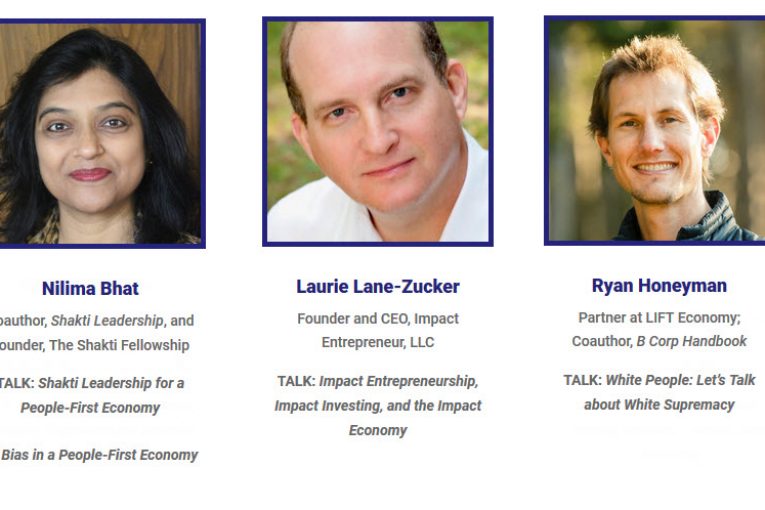
 by Scott Steward
by Scott Steward
People-First Economy Online Summit (https://peoplefirsteconomyonlinesummit.com). I am providing a progressive economy menu for the reader to reflect on and choose from. The speakers are mostly concerned with intentional inclusive economy that turns away from waste stream fossil fuel dependence. Here are the 3 speakers from Day 7.
Nehe Sangwan, MD. On “Preventing Burnout: Why Leaders Must Heal Themselves to Create a People-First Economy.” Neha is the CEO and founder of Intuitive Intelligence, physician, international speaker, executive coach, and corporate communication expert
The emerging trend toward “self-care” as part of the workplace acknowledges two trends: 1) technology has given leaders an option to be in a perpetual “on-call” mode. 2) leaders most often don’t know how to pause a situation and move toward solutions and away from dysfunctional relationships. Stress signals are ignored. Most leaders develop strategies to override those signals to keep going. They sleep less, drink more coffee, adopt other self-medication and/or neglect disabling physical limits to “keep-up.”
The problem is you can’t fulfill your purpose if your exhausted and you may not ever define/engage your purpose within the organization because you are exhausted. Organizations are recognizing the stress problem and making the link to better performance through self-care. The new model teaches leaders about self-care for themselves and their team. Moving out of your comfort zone is no longer shamed, but offered openly as part of the creative work process. “I’m going to try this even though I’ll admit to feeling a little uncomfortable; lets proceed and see if we can make this work.” “Leaders need to have grace for themselves and grace for the people they lead if we are going to succeed as a People-First economy.” Neha’s Bonus: Talk RX: Five Steps to Honest Conversations that Create Connection, Health and Happiness Excerpts.
Hawk Newsome: “Racism in America”
Mr. Newsome is an activist at the forefront of the New Civil Rights Movement and Chairperson of BLMgreaterNY.
In a power tour of blackness Hawk Newsome personalizes what it is to be black and his being pro-black. It’s not an easy trip as the negative connotations for being black are international and depressingly unchanged in the last several decades. There is no relief in the current political structure and there is a persistent avoidance of black only advocacy. “NAACP National Association for the Advancement of Colored People – I can’t really find an black organization that really has a black name. You can be the Antidefamation League, JPG, Jewish, Latino this or that. If you fight under a black banner you get attacked. You want to talk about systemic racism, how deep is that?
Any recommendations for business or organizations? “You don’t need suits going into corporations with their polished ways and capitulating style of diversity training. No, you need some hard core activists who can present well when necessary and have them come in there and talk to your folks in a real way. You need to present your employees with real information as if racism is a disease. Find out how racist your corporate culture really is.” “If you want to help black people, promote them, lift them up.” Hawk’s bonus” Exclusive – extended unedited talk with Ryan Honeyman
Adam Kahane: “Super Teams for Super Results”
Adam Kahane is a Director of Reos Partners, Author of “Solving Tough Problems” and “Collaborating with the Enemy: How to Work with People You Don’t Agree With or Like or Trust.”
A book with “Work with People You Don’t Agree With” in the title seems to be topical. Adam’s company “Reos” has been in the “how do we get it done” business for a long time. His work with Columbia in 1996 was remembered by the President, Juan Manuel Santos, who won the 2016 Nobel Peace Prize for ending his country’s 52 year old civil war, “What I learned … is that it is possible to work with people we do not agree with and will never agree with.”
Super teams can become successful if they can manage to stretch together. Super teams actors might include monied interests, governments, activists, organizations, local spokespersons, regulators and/or educational institutions; each of whom have some shared interest in solving immense thorny problems, but see things very differently. If each of the actors in the supper team “stretch” (Adam’s term) they might succeed in making progress.
The first of three stretches is to shed the idea of needing to have similar goals or sense of purpose between actors. It is not true “that we have to agree with people to work with them effectively.” That is stretch one. The second stretch is to experiment a way forward. “Take a step in the direction you think will work and see what happens, what’s the feedback and then adjust. A plan to implement the solution would be nice, but a lot of the time it doesn’t work. The main reason is we don’t know what’s going to work before we start.” The third stretch is to “recognize that you are a player of the game.” On a super teams, each actor only has control over what they will do. Adam helps super teams apply these stretch goals all over the world. Adam’s bonus: “How to Learn to Stretch ”